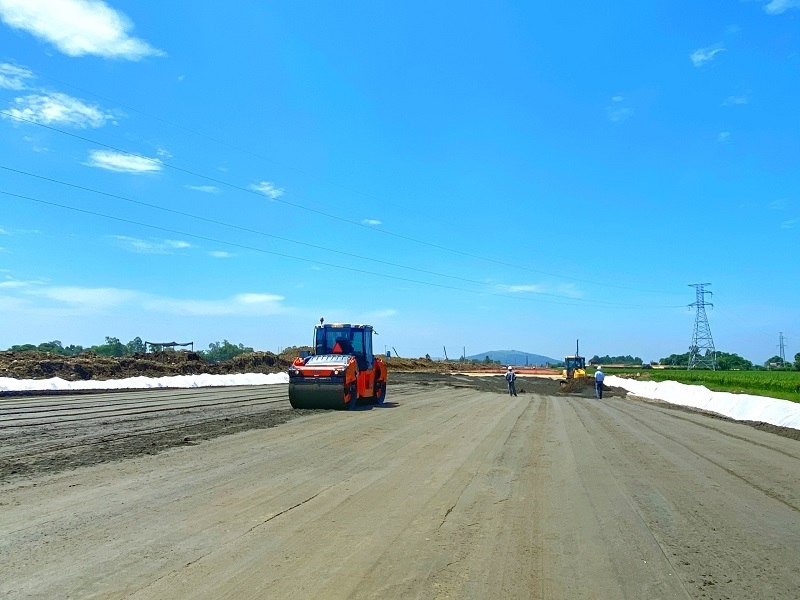Corporate bond issuance proposed for building 3,800km expressway
 |
| The section of the North-South Expressway running through Thanh Hoa province |
Transport infrastructure firms are proposing three main capital sources for implementing public private partnership (PPP) projects, including state budget capital, equity capital, and capital raised from other resources. For the latter, the issuance of corporate bonds is being endorsed by leaders at all levels and experts alike.
According to Nguyen Viet Huy, deputy director of the PPP Department under the Ministry of Transport, issuing corporate bonds is a legitimate solution helping to open the door for investors to participate in implementing highway projects under PPP method.
Huy raised the example of Deo Ca Group, a major developer of transport infrastructure projects in central Vietnam, which succeeded with the implementation of capital-intensive projects with limited access to credit like the Deo Ca Tunnel project or the Bac Giang-Lang Son and Trung Luong-My Thuan expressway projects BY using diverse capital mobilisation methods.
| The biggest problem related to the issuance of corporate bonds is the slow adjustment of tax policies, especially regarding interest payment at BOT projects. |
Huy added that while previous legal documents guiding PPP projects restricted capital mobilisation to borrowing from from credit institutions, this is now a significant barrier to implementing large-scale transport PPP projects.
“According to the newly-promulgated Law on PPP Investment, in addition to borrowing capital from credit institutions, capital can now also be mobilised through lawful organisations or individuals. I think this is the right direction in the context of the restricted budget, especially when infrastructure development needs to be one step ahead of emerging needs," said Huy.
Currently, Decree No.28/2021/ND-CP regulating the financial management investment of PPP projects provides has provided specific instructions on necessary procedures and steps to help PPP enterprises in bond issuance.
PPP projects following the build, operate, transfer (BOT) format are not like real estate projects or other development projects. In the early years of BOT projects operation, cash flows are often limited due to the low volume of vehicles as well as the interest and principal burden payable to the bank.
The biggest problem related to the issuance of corporate bonds is the slow adjustment of tax policies, especially regarding interest payment at BOT projects.
“To ensure the effective enforcement of the Law on PPP Investment, it is necessary to clearly separate PPP project enterprises from normal businesses. The financial plan of the PPP project must include the repayment schedule throughout the life cycle of the project, which can last up to 30 years. I think it is necessary to remove the current tax policy inadequacies in order to ensure the projects' economic efficiency," Huy noted.
Tran Chung, chairman of the Vietnam Association of Road Traffic Investors (VARSI) said that VARSI has received a document from Deo Ca Group proposing to settle the inadequacies in the accounting and allocation of interest expenses at current PPP projects.
On the basis of recommendations from Deo Ca Group and other BOT investors, VARSI will report to the government and submit a proposal to the National Assembly to remove difficulties for BOT transport infrastructure projects.
“In fact, no PPP projects have been implemented in the past five years. Most PPP projects cannot find investors because they don’t have a bank guarantee. If we restrict the mobilised capital to bank credit only, several projects that have signed contract would face being invalid because of the low possibility of having able to sign a credit contract with bank after a short period of time as the regulated six months,” said VARSI chairman.
The focus of the public investment plan in the next 10 years is to make 3,800km of highways, as stated by Prime Minister Pham Minh Chinh at a recent government meeting. This task is an important part of three strategic breakthroughs to lift the country’s development to a new height.
The target is basically completing the Eastern Cluster of the North-South highway network(about 3,000km) by 2025, and having in place about 5,000km of expressways by 2030.
The three strategic breakthroughs are synchronously completing development institutions, particularly those on developing a socialist-oriented market economy; developing high-quality human resources; and building a seamless and modern infrastructure system both economically and socially.
What the stars mean:
★ Poor ★ ★ Promising ★★★ Good ★★★★ Very good ★★★★★ Exceptional
Related Contents
Latest News
More News
- SK Innovation-led consortium wins $2.3 billion LNG project in Nghe An (February 25, 2026 | 07:56)
- THACO opens $70 million manufacturing complex in Danang (February 25, 2026 | 07:54)
- Phu Quoc International Airport expansion approved to meet rising demand (February 24, 2026 | 10:00)
- Bac Giang International Logistics Centre faces land clearance barrier (February 24, 2026 | 08:00)
- Bright prospects abound in European investment (February 19, 2026 | 20:27)
- Internal strengths attest to commitment to progress (February 19, 2026 | 20:13)
- Vietnam, New Zealand seek level-up in ties (February 19, 2026 | 18:06)
- Untapped potential in relations with Indonesia (February 19, 2026 | 17:56)
- German strengths match Vietnamese aspirations (February 19, 2026 | 17:40)
- Kim Long Motor and AOJ Suzhou enter strategic partnership (February 16, 2026 | 13:27)

 Tag:
Tag:


























 Mobile Version
Mobile Version